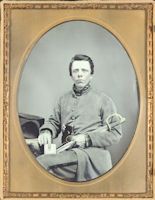JUNE 20TH.—This morning our whole line of artillery—seven miles long—opened on the doomed city and fortifications at six o’clock, and kept up the firing for four hours, during which time the smoke was so thick we could see nothing but the flash of the guns. No fog could have so completely hid from view objects around, both close and familiar. Had the rebs made a dash for liberty then, they could not have been discovered until they were right upon us. But they did not do it. Our infantry was all called out in line of battle, and we stacked arms till the firing ceased. O, what a calm after that terrific bellowing. There was every variety of tone to-day from the dogs of war—from the squeak of a little fiste to the roar of a bull dog. The sound of some brass pieces was so loud as to drown the reverberations of the larger guns, and not a return shot was fired.
Poor fellows, how tamely they took it! They had nothing to say—at least that we could hear. Several of our boys laid down and slept during the firing as soundly as if they had been on their mothers’ feather beds at home. When the clouds cleared away I thought the stars and stripes never looked so beautiful. Even if the defenceless women and children in Vicksburg are protected, or feel as if they were, such a screeching of shot and shell must prove a terror to them, and my heart has not yet grown so hardened that I can not feel for them.
There is a good deal of complaint, in our company at least, about the coffee we get. It seems not quite so good as that we have had, and I suspect it has been adulterated by somebody who is willing to get rich at the expense of the poor soldier, whose curses will be heaped strong and heavy on anybody who deteriorates any of his rations, and particularly his coffee. The only time a soldier can not drink his coffee is when the use of that ration is suspended. In fact, there is nothing so refreshing as a cup of hot coffee, and no sooner has a marching column halted, than out from each haversack comes a little paper sack of ground coffee, and a tin cup or tin can, with a wire bale, to be filled from the canteen and set upon a fire to boil. The coffee should not be put in the water before it boils. At first I was green enough to do so, but soon learned better, being compelled to march before the water boiled, and consequently lost my coffee. I lost both the water and the coffee. It takes but about five minutes to boil a cup of water, and then if you have to march you can put your coffee in and carry it till it is cool enough to sip as you go. Even if we halt a dozen times a day, that many times will a soldier make and drink his coffee, for when the commissary is full and plenty, we may drink coffee and nibble crackers from morning till night. The aroma of the first cup of coffee soon sets the whole army to boiling; and the best vessel in which to boil coffee for a soldier is a common cove oyster can, with a bit of bent wire for a bale, by which you can hold it on a stick over the fire, and thus avoid its tipping over by the burning away of its supports.









